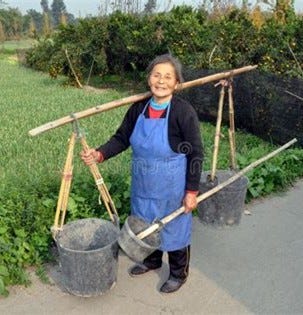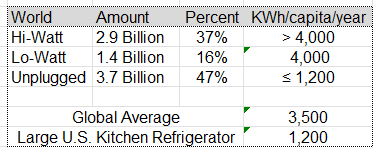Economist Thomas Sowell has noted that the normal needs no explanation. We need to study what is unusual and explain that. He studies wealth rather than poverty because poverty is virtually universal, and prosperity and wealth are unusual.
In viewing the status of women, the period starting about a hundred years ago in North America and post-war Europe is a unique period in the median lifestyle of a woman in society. Both her home and her neighborhood shopping are entirely different. Indoor plumbing provides immediate, hot, and cold water on command. Washers and dryers simplify tasks that once took significant effort.
Ancient royalty would envy the modern person about meals. A hundred years ago, we had literal “iceboxes” with ice, milk, and beer delivered daily. Our refrigerator freezers let us shop and store milk, beer, ice cream, TV dinners, and many international foods. Stoves, ovens, and microwaves can heat food with little physical effort.
More importantly, these tools and aids give women time to explore their interests. They can pursue their education or career. Homes have lighting and entertainment, allowing for simple relaxation.
Now that you have settled in and are ready to take that all for granted, I am going to be rude. Those who engage in Bible studies read about women going to the well and carrying water home. You may think a life different from yours is a thing of the past. It is not.
A recent conference in London called the Alliance for Responsible Citizenship featured a remarkable number of common-sense discussions by notable people about the state of the world.
One talk was especially riveting for anyone remotely interested in improving the lot of women in the world. Robert Bryce’s The People Climate Activists Leave Behind can be summarized in the title of one slide:
Electricity Frees Women & Girls From The Pump, The Stove, And The Washtub
At least 47% of the world’s population lives without that freedom. One slide had the following information:
Consider a world without electricity and appliances or running water. There is no water in your house unless you go to get it and carry it back to the house. How do people in your home get clean clothes? You wash them by hand. Bryce notes that 2.5 billion women and girls still wash clothes by hand.
Cooking meals is much more difficult and dangerous in a world without gas or electric stoves. You burn whatever is flammable. Often, that is biomass, including dung.
1 billion people are still cooking with Solid Fuels
Indoor Air Pollution from Cooking with Biomass Kills More People Than AIDS/HIV, Cholera, Malaria, & Tuberculosis Combined
Given that level of misery, you would think the wealthy women of the world would want to get electricity to the poor as soon as possible to alleviate the problem, get those women a better life, and open a world of education for them. Sadly, the more fortunate women are too busy saving the planet to help.
The great cause of the day is “NetZero” and “Renewable Energy.” Bryce has a chart showing the top 25 organizations in what he calls “The Climatism Industry” are part of a $4.7 Billion Per Year Business. That’s almost two dollars a year for every woman washing clothes by hand.
The World Economic Forum, European Union, and establishment political parties are locked in on this. He cites the case of a country called Ginnea-Bissau. It is desperately poor, with a per capita income of $982 and CO2 emissions of 0.17 tons. But that doesn’t matter. The World Bank still wants them to reduce emissions by 30% by 2030. These people use virtually nothing, but if they use anything, the fanatics demand they cut.
As you can tell, if I hadn’t kept using Mr. Bryce’s name, I would be guilty of plagiarism in this article. I admit it is a “book report” of his speech. I will repeat the link and urge you to watch:
I could quote more from the end of his talk, but I want you to hear his excellent phrasing directly. He has a superb way of getting to the heart of the matter and coining phrases that will stick with you. His entire talk is excellent, but the ending is terrific.
I will wrap this up by saying we have a choice. Even if we could go carbon neutral, we can’t be sure it will matter in terms of saving the planet. By denying the world’s poor access to cheap energy, we are undoubtedly keeping them from reaching their potential. This is especially true for women.
Anyone who wants the best for the world’s women might at least consider this when they are asked to donate to groups working to keep energy from the world’s poor.


